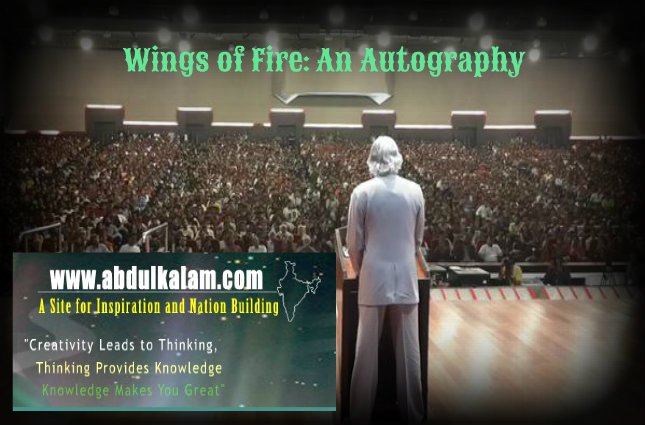I opened the draft/unpublished section and felt like completing the unfinished blog posts. This time the mind went to the oldest posts, still unpublished. To my surprise, this post was a complete post yet not published. Then I checked the publication details. It was created on 08 Jan 2015 at 10:34:35 and then went to drafts.
We had lost Kalam Sir in July 2015. If this was published while he was there, it was for the students who were reading Wings of Fire as their first-year textbook. I do remember that I had to lay down an ethical conspiracy to include his autobiographical book and Jonathan Livingston Seagull in the curriculum. Kalam still isn't far from us. I wonder that, even after 07 years of his departure, his presence and stature is unparallel. This is what we call a Leader, a Teacher and a true Human. (Below is the post as written in 2015.)
One doesn't need to know rocket science to know Kalam. The only pre-requisite to know the Man of Science and Spirituality is your willingness. He is not an entertainer; he is not a fantasy fiction writer; he is neither a stand-up comedian nor a mime artist, or a celebrity from the '...woods'! He is the one whom we Indians know as a Man of conviction-patriotism-dedication-Missile Man-President of India - Bharat Ratna.
He is the one who is still a Teacher.
Avul Pakir Jainulabdeen Abdul Kalam (born 1931), our dear Kalam, has been one of the leading scientists in the world who have been able to make a difference in defence research with a welfare vision. Reading him is like reading prayers. His profundity of vision and range of ideas mesmerize you. He comes from a village known for the famous pilgrimage temple of Lord Shiva. Rameshwaram, where Kalam was born and brought up has a glorious history of being representative of India's cultural heritage of Religious Peace. He has been a teacher with a mission to ignite the mind of young Indians. He has been sharing his motivating thoughts in all parts of the country and has an indomitable spirit to engage with youth. He believes in them and instantly connects with them. He believes that there are only to types of people- Young and Experienced. He wants us to Learn and Be Human with Empathy.
To teachers he says:
If a country is to be corruption free and become a nation of beautiful minds, I strongly feel there are three key societal members who can make a difference. They are the father, the mother and the teacher.
To the Youth :
My message, especially to young people is to have the courage to think differently, the courage to invent, to travel the unexplored path, courage to discover the impossible and to conquer the problems and succeed. These are great qualities that they must work towards. This is my message to young people.
As Arun Tiwari, who assisted Kalam in his laboratory as well as in the writing of Wings of Fire says "For myself, writing this book has been like a pilgrimage. Through Dr Kalam, I was blessed with the revelation that the real joy of living can be found in only one way- in one's communion with an eternal source of hidden knowledge within oneself-which each individual is bidden to seek and himself or herself.
It is a Story for the Ordinary Indian. To those who are very dear to Kalam and for sure, Kalam is equally dear to them."
Kalam opens the autobiography with the poem "To the Memory of My Parents" and makes us realise that Parents remain Supreme.
Last Stanza of the Poem:
When at midnight I woke with tears falling on my knee
You knew the pain of your child, My Mother.
Your caring hands, tenderly removing the pain
Your love, your care, your faith gave me the strength
To face the world without fear and with His Strength.
: APJ Abdul Kalam
Wings of Fire is a book of around 180 pages divided mainly into five segments-corresponding to the life of Dr Kalam. After the Introduction, he goes on to share Orientation-Creation-Propitiation-and Contemplation. The autobiography concluded with an Epilogue. While reading the spontaneous introduction you start falling in love with the maturity and simplicity of Kalam. He creates a canvas of the contemporary world when the book came into publication (1999) and starts walking with us as a friend. He is so apt, so rational when he says:
"Historically, people have always fought among themselves on one issue or another. Prehistorically, battles were fought over food and shelter. With the passage of time, wars were waged over religious and ideological beliefs; and now the dominant struggle of sophisticated warfare is for economic and technological supremacy. Consequently, economic and technological supremacy is equated with political power and world control. A few nations who have grown very strong technologically, over the past few centuries, have wrested control, for their own purposes. These major powers have become the self-proclaimed leaders of the new world order.
WHAT DOES A COUNTRY OF ONE BILLION PEOPLE, LIKE INDIA, DO IN SUCH A SITUATION?"
(after reading the above excerpt, I am sure you will suggest the same..what He achieved for India and mentioned in this book-1999)
"We have no other option but to be technologically strong. But, can India be a leader in the field of technology? My answer is an emphatic 'Yes'. And let me validate my answer by narrating some incidents from my life."
Hereafter, we start listening to him as he narrates the story of Modern India. He talks of his Rameshwaram and makes it Ours! He tells us about his family, friends, Mosque and the temple, his selling of newspapers, his understanding of Religion and Spirituality, his student life, his Teachers, his colleagues and seniors.
Quoting him from the Introduction segment of the book, we realise that he has created a discussion in the introduction. He seems to deliver an address to his students. He earns our acknowledgement for the narration of his life as an allegory of the life of any Indian. He represents you and me and all. In 2010, a movie came with the title 'I am Kalam' and went on to get the best of the awards and appreciations. This was not based on Kalam's life, this was a manifestation of what his life stands for Inspiration and Willingness to Learn. Harsh Mayar (Chhotu in the movie) follows what Kalan believes in: "Great Dreams of Great Dreamers are always Transcendent." This movie is recommended to those who feel inspired by Kalam and his life. Chhotu, a boy who is deprived of education starts learning by himself and goes on to name himself as 'Kalam'. His indomitable spirit to learn in spite of all odds is representative of what Kalam Sir has been teaching all through his life.
The Introduction ends with the following words. We wonder how someone at this height of achievement is so humble and so pure. At a time when the world is running for credit, for money, here is a 200% Indian who opens his heart to us:
"Each Individual creature on this planet is created by God to fulfil a particular role. Whatever I have achieved in life is through His help and an expansion of His will. He showered His grace on me through some outstanding teachers and colleagues, and when I pay my tributes to these fine persons, I am merely praising His glory. All these rockets and missiles are His work through a small person called Kalam, in order to tell the several-million mass of India, to never feel small or helpless."
We are all born with a divine fire in us. Our efforts should be to give wings to this fire and fill the world with the glow of its goodness.
Let Us read the autobiography which is written for the ordinary people of India for whom Dr Kalam has immense affection, and of whom Dr Kalam is certainly one. (Download the Text)
Make him your Spiritual Friend!







